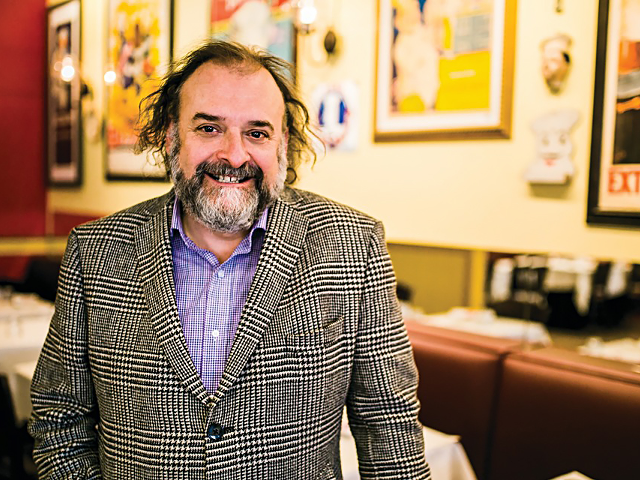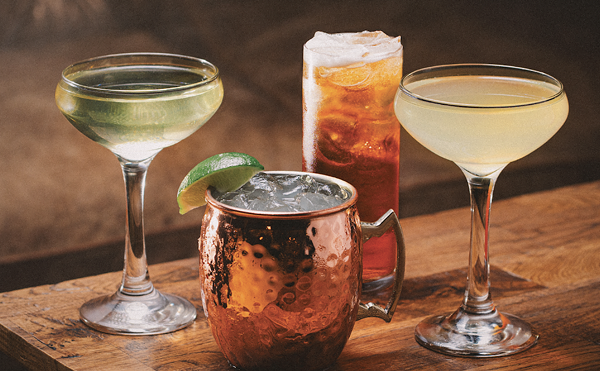Kayla Robison expected it would take decades for her to reach the success she had always dreamed of in the food industry. When she graduated from Cincinnati State’s Midwest Culinary Institute in 2012, she didn’t realize how quickly her career was going to take off.
But now, more than eight years later, to say that Robison keeps busy is an understatement. She teaches virtual cooking classes, works full-time as the executive chef at Arnold’s Bar and Grill in Cincinnati and has filmed shows with the Food Network and Cooking Channel such as “Guys Grocery Games,” “Cheap Eats” and “Man Vs. Food.” Robison has even filmed a cooking segment on the “Today Show.”
Her passion for restaurant work began when she was 14 years old, when she became a host near her home in North Dakota. She longed to work in the kitchen, but her boss informed her that girls didn’t work in the back of house. That didn’t faze her.
“I made a deal with him,” she recalls. “If I bussed and washed dishes for a few months that he would train me in the back.”
Robison has been working in a kitchen ever since.
Food, Robison knows, brings people everywhere together. It is the “centerplate” of what is taught at the Midwest Culinary Institute (MCI), says Grace Yek, a professor in the program. No matter what Yek is teaching her students – whether it be knife techniques or fundamental skills like creating stocks and sauces – food is at the center of it all. One of Yek’s favorite courses to teach is international cuisine.
“It is so enriching to not only drive home those technical skills,” she says, “[but] it is really about the wealth and the embedded story of food.”
Future chefs have been learning culinary arts at MCI since the institute originated in 2004. However, the journey to developing a renowned culinary school in the heart of Cincinnati began long before this back in 1983, when Chef John Kinsella became the first full-time culinary instructor at Cincinnati State.
When Kinsella first started teaching, the program only had one kitchen in the college’s main building, says Richard Curtis, media coordinator at Cincinnati State.
“[Kinsella] made it known from the beginning that he wanted to build a major culinary program at the college,” Curtis says. “The 20-year quest culminated in the launch of the nationally recognized Midwest Culinary Institute program [in 2004].”
These days, MCI boasts a dozen state-of-the-art teaching kitchens, one culinary demonstration kitchen, and the Summit Restaurant, where students can work on their practical restaurant skills. Although Kinsella retired in 2013, he was able to see the early results of his hard work.
Yek, who has taught at MCI for a year, has helped to develop a new Bachelor of Applied Science program that began in the fall. Cincinnati State is traditionally a two-year college, and MCI offers many associates degrees like brewing science, pastry arts, hospitality management, and more.
Yek considers the new bachelor’s degree to be a “gamechanger” at MCI. It blends food science with the study of culinary arts into one degree.
“We’re basically marrying the two fields of culinary arts,” says Yek, who serves as the chair of the new program. Yek says she is encouraged by the number of students who have expressed their interest in the bachelor’s degree, despite how COVID-19 has affected everyone.
The pandemic has affected how chefs handle cleanliness in the teaching kitchens at MCI. Although sanitation in a kitchen is always a priority, these times require even higher standards. Ashley Martinez, one current student, says her professor/chef is committed to keeping the teaching kitchens open by strictly enforcing face coverings, face shields, gloves and extra hand washing.
Martinez says they are strict in the best way possible, but the pandemic has not lowered the standards that MCI places on culinary students either. Students have several recipes they must make individually during each class session.
“To prepare for class, you have your prep sheets already written out in terms of how much you need of a certain ingredient,” Martinez says. “As soon as you get into the classroom, you are measuring out [everything].”
After each dish is prepared during a typical six-hour session, students are critiqued on flavor, execution of the recipe and presentation.
Before enrolling at MCI in 2018, Martinez earned her master’s degree in nutrition after years of cheerleading spurred her interest in fitness and healthy living. Now she works at the Kroger Company in Cincinnati as a subject matter expert in nutrition for the grocer’s Culinary Innovation Team.
As she began collaborating with product development chefs at Kroger, Martinez realized that she wanted to know more about food other than just the nutritional aspects. The chefs she worked with inspired her to advance her education by pursuing a culinary arts degree at MCI.
“[It] would just help my job as a culinary dietician to be able to collaborate better with my team,” she says.
Martinez seemingly had a leg-up in her culinary classes because of her background in nutrition, but she says she was still nervous in the beginning, though she calmed as she acclimated. Organization is the key to success in the kitchen, and she says that preparing for class means thinking ahead about how she can be most efficient with her ingredients and time management.
Although the hands-on nature of culinary school is unlike most college programs, one similarity remains: exams. For their final exam, Martinez’s baked a cake and incorporated a mousse, a sauce, an ice cream and a tulle, or a unique design, on top. Students had a few weeks to prepare for their exams, which allowed them to be creative and express themselves through their recipes.
Another difficult area of baking that Martinez has slowly mastered is pastries.
“It’s hard for me to have patience, and you have to have patience in baking,” she says. “You have to really keep an eye on the ingredients that you’re mixing and [when].”
Her professor Grace Yek loves to see her students grow in the kitchen, and while she is challenging them and helping them master culinary skills, she also encourages them to pursue their dreams.
“There is just a deep satisfaction about being able to spark an enthusiasm or a different viewpoint in my students,” Yek says, “and to see them go after it and be lifted to their full potential.”
Yek says her students aren’t the only ones learning in her classroom; they have taught her that there is beauty in different techniques and ways of approaching food.
“They might show me how they learned [something] growing up, for example, and that’s great. I think it adds more fodder to the whole exchange of information,” Yek says.
Although Yek must adhere to the standards that MCI places on culinary instruction, she values that everyone has a story behind why they might do something differently.
Yek tells many stories of her own, too. On top of instructing at MCI, she also writes a personal blog, Our Kitchen Roots, and freelances for local media outlets like WCPO, Polly Magazine, and Movers and Makers, an arts and culture magazine in Cincinnati.
“It’s what I do whenever I have free time,” she says. “It’s very gratifying.”
Yek describes her journey as anything but linear. She has a master’s degree in engineering from Vanderbilt University in Nashville, but it wasn’t until the company she worked for laid her off that Yek did some soul searching.
“It was during that time that I dug deep and decided to immerse myself in food, which was a lifelong love,” she says.
Yek became certified with the American Culinary Federation after years of shadowing chefs and teaching herself many of the techniques she now teaches to her own students at MCI. Her advice to those who are nervous to take the plunge into culinary school is simple.
“Know your own heart, and don’t be too self-conscious about putting yourself out there and not being the best in the field immediately,” she says. “Be prepared to work at it. It’s ok to show up and start doing things and get better from there.”
That sentiment is what inspired Kayla Robison, the MCI alumna. Once she discovered she could go to school to become a chef, she jumped on the opportunity.
Robison’s experience working in restaurants from a young age helped her realize her calling, and being a teen mother at the time never hindered her work ethic. She moved to Cincinnati in 2011 with her 1-year-old daughter to attend MCI because it was affordable, plus she had family in the area who could help her. Robison hit the ground running when she decided to complete her degree in culinary and pastry in just one year.
“I literally had no life for an entire year,” she says. Robison and her daughter have lived in Cincinnati ever since.
Right after college, she worked as a pastry chef for a few years before she landed a job as an executive chef at Nation Kitchen and Bar in Cincinnati. The new restaurant was just opening, and Robison helped develop their menu.
“We boomed in our first year to one of the best burger joints in the city and got well-known” Robison says. “We were [even] featured in Cosmo[politan] Magazine.”
After this, the young chef says she was contacted by “Cheap Eats,” and it’s been a whirlwind ever since. Robison considers the Food Network connection fortunate, as she was able to travel around with famous chefs. She jumped at every opportunity she was offered, like when “Guy’s Grocery Games” and the “Today Show” contacted her to film episodes.
Robison doesn’t hoard the secrets to her success, either. She shares her abundance of knowledge with other budding chefs whom she trains.
“My biggest accomplishment would be watching the people who I’ve trained [transform] their lives and become executive chefs themselves,” she says. “Before COVID, we partnered with a rehab facility that helps men and women stay sober.”
Robison has been able to show those recovering in the facility how to build their careers as chefs.
“[Food] is the one thing that has no barrier,” Robison says. “Everyone has to eat, and that’s how you show people your love.”
Learn more about Midwest Culinary Institute.







